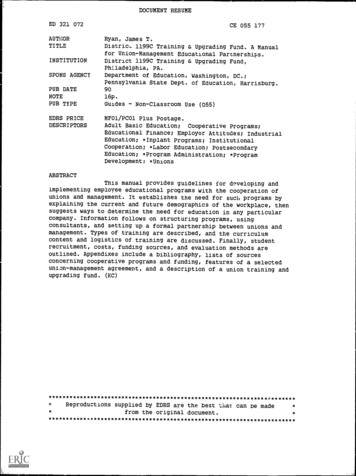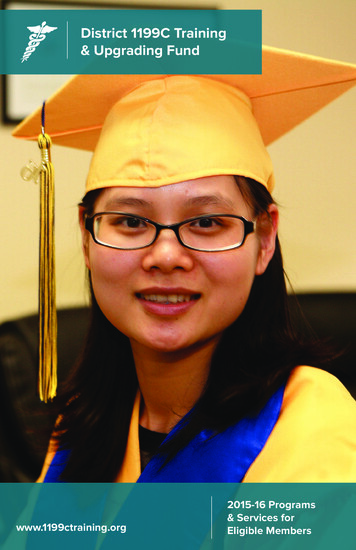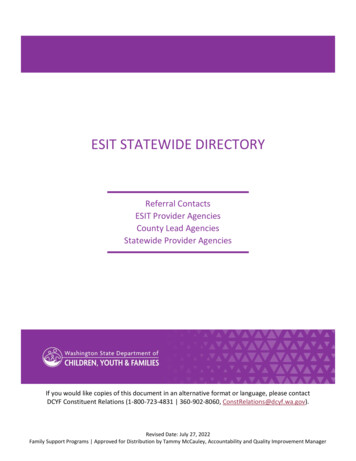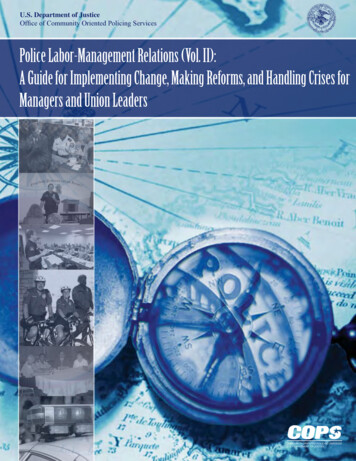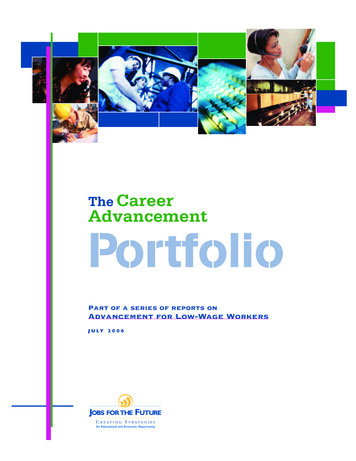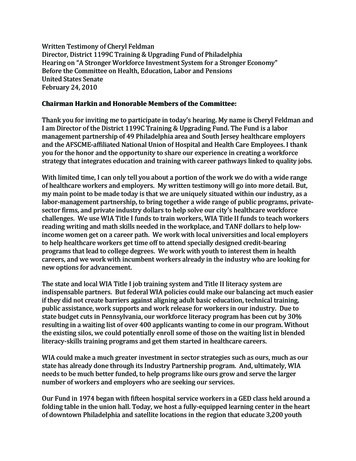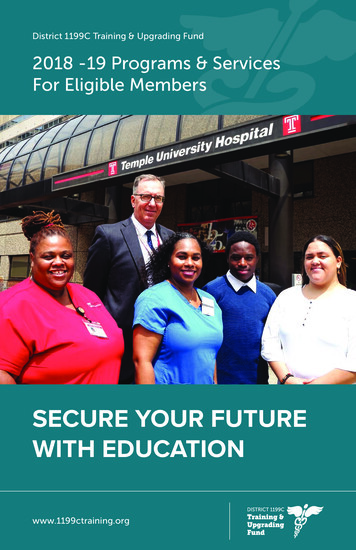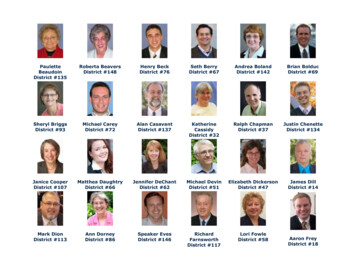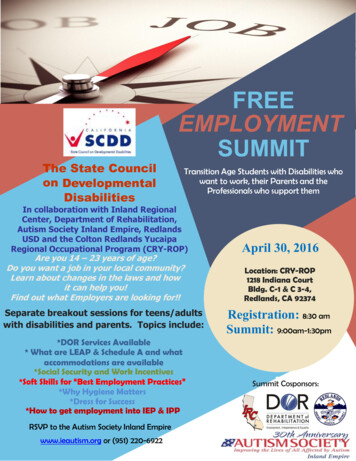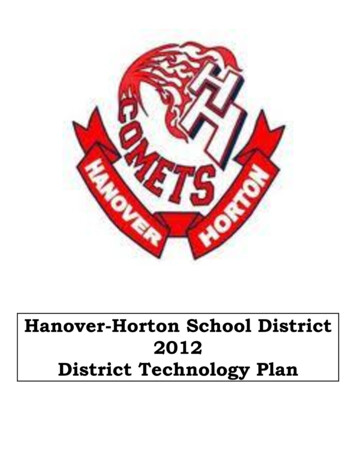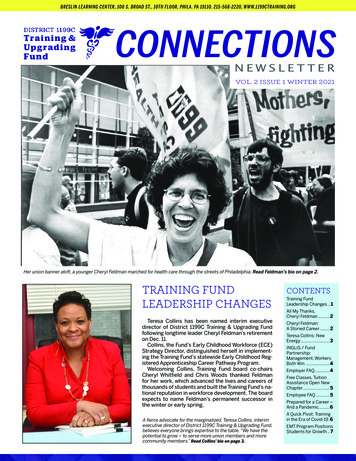
Transcription
BRESLIN LEARNING CENTER, 100 S. BROAD ST., 10TH FLOOR, PHILA. PA 19110. 215-568-2220, WWW.1199CTRAINING.ORGDISTRICT 1199CCONNECTIONSNEWSLETTERVOL. 2 ISSUE 1 WINTER 2021Her union banner aloft, a younger Cheryl Feldman marched for health care through the streets of Philadelphia. Read Feldman’s bio on page 2.TRAINING FUNDLEADERSHIP CHANGESTeresa Collins has been named interim executivedirector of District 1199C Training & Upgrading Fundfollowing longtime leader Cheryl Feldman’s retirementon Dec. 11.Collins, the Fund’s Early Childhood Workforce (ECE)Strategy Director, distinguished herself in implementing the Training Fund’s statewide Early Childhood Registered Apprenticeship Career Pathway Program.Welcoming Collins, Training Fund board co-chairsCheryl Whitfield and Chris Woods thanked Feldmanfor her work, which advanced the lives and careers ofthousands of students and built the Training Fund’s national reputation in workforce development. The boardexpects to name Feldman’s permanent successor inthe winter or early spring.A fierce advocate for the marginalized, Teresa Collins, interimexecutive director of District 1199C Training & Upgrading Fund,believes everyone brings expertise to the table. “We have thepotential to grow – to serve more union members and morecommunity members.” Read Collins’ bio on page 3.CONTENTSTraining FundLeadership Changes.1All My Thanks,Cheryl Feldman. 2Cheryl Feldman:A Storied Career. 2Teresa Collins: NewEnergy. 3INGLIS / FundPartnership:Management, WorkersBoth Win.4Employer FAQ.4Free Classes, TuitionAssistance Open NewChapter. 5Employee FAQ. 5Prepared for a Career –And a Pandemic. 6A Quick Pivot: Trainingin the Era of Covid-19. 6EMT Program PositionsStudents for Growth. 7
CONNECTIONSVOL. 2, ISSUE 1, WINTER 2021ALL MY THANKS,CHERYL FELDMANDear Training & Upgrading Fund Students,After 43 years working at the Training Fund, I’veretired as executive director of District 1199CTraining & Upgrading Fund. And as I do, I want toexpress my deepest gratitude to you.So much of the work of an executive director canbe demanding. There are budgets and grants,applications for insurances, and keeping up withregulatory requirements. It’s very time consuming and sometimes it’s overwhelming. Often youcould find me buried underneath piles of paperwork in my office.But sometimes I’d escape into the hallway. There,I’d hear your stories of success, of overcoming challenging obstacles. I’d see the light in your eyes andhear the excitement in your voices. And every June,I’d watch two blocks of graduates parading alongBroad Street for ceremonies at the Kimmel Center.Each time, I’d realize anew how I was so lucky tohave a job where daily I could be inspired by theTraining Fund’s students and graduates. With resilience, you bravely took learning into your ownhands. You decided, despite everything, to make adifference for yourselves and your families, whilepositively impacting your employers, your community, your city and really, the world.Cheryl Feldman with then Vice President Joe Biden at a White Housemeeting on workforce development and training in 2015.CHERYL FELDMAN:A STORIED CAREERYour example made it possible for me to returnto my tasks energized and inspired. Your examplegave my life fulfilment and satisfaction.I’m particularly grateful to my mentor, HenryNicholas, the visionary union leader who madeequal access to education and the opportunity foradvancement the major focus of a labor management organizing strategy.Cheryl Feldman’s desk onthe 10th floor of the Land Titlebuilding in Center City Philadelphia looked very differentin early December.Mountains of reports, files,documents, working papersand memos that usually towered over her head began tomelt away as Feldman, longtime executive director ofthe District 1199C Training &Upgrading Fund, prepared forher Dec. 11 retirement.“It’s a lot of work,” she said,mid-filing and sorting.Is and was.On Dec. 11, 43 years to theday from when she started asa Training Fund project manager, Feldman turned overthe reins to interim directorTo the Training Fund board, workforce partners,and my Training Fund colleagues, I thank youdeeply as well for your support and encouragement. Together, we’ve shared many challengesand joys, pressing forward with the criticallyimportant work of creating quality education andtraining programs leading to family sustainingemployment and career advancement.Students, colleagues, friends, as we look to thefuture, I wish you continued fulfillment and muchsuccess.All the best always,CHERYL FELDMAN-2 -Teresa Collins with that blendof exhilaration and sadnessso familiar to people luckyenough to have made theirmission their work.“We’re a worker-based educational center,” Feldmansaid. “The Training & Upgrading Fund has become an anchor institution in Philadelphia, serving everyone withits doors open.”Chris Woods, president ofthe National Union of Hospital and Health Care Employees District 1199C andco-chair of the Training Fund’sboard, said Feldman’s leadership is obvious at graduationswhen so many students arehonored for their successes.continued on Page 8
BRESLIN LEARNING CENTER, 100 S. BROAD ST., 10TH FLOOR, PHILA. PA 19110. 215-568-2220, WWW.1199CTRAINING.ORGTERESA COLLINS: NEW ENERGYTeresa Collins, the interim executivedirector of District 1199C Training & Upgrading Fund, tends hundreds of plantsinside and outside her home in Philadelphia’s East Oak Lane neighborhood.She’s gentle with them, nurturing.But fierce would be a better descriptionfor Collins when it comes to advocatingfor the mistreated, downtrodden, and disadvantaged.“I see things the way they are,” she said.“If I see someone receiving somethingthat’s not equitable, I’m going to fight forthat person, it doesn’t matter what colorthey are.”Collins became the Training Fund’s interim director Dec. 11, taking the reinsfrom longtime leader Cheryl Feldman,who retired after 43 years of service. “I amthrilled to pass the torch of leadership toTeresa,” Feldman wrote, describing Collinsas passionate about workforce development and apprenticeships.“Upgrading makes a lot of sense, because it is building up skills for the community,” Collins said. “People feel goodwhen they have a job, and they are goodat it.“COVID has changed everything, somy priority is to be ready post-COVID tosupport the poor communities, especially poor communities who have beenimpacted financially, job-wise and education-wise.“When the doors open, I want to bethere with my arms open wide to welcomethem into the Training Fund -- to be readyto support communities, young people,people who were forced to leave the workforce because of COVID and get them ontheir feet again,” Collins said.“We have the potential to grow – toserve more union members and morecommunity members,” she said.With 25 years of experience in earlychildhood education and workforce compliance, Collins came to the Training Fundabout four years ago. Serving as EarlyChildhood Workforce Strategy Director,she distinguished herself by implementing a statewide apprenticeship programin early childhood education.Collins, married and a mother of four,grew up in rural western Pennsylvania.While the larger community was white,her family and her neighbors were African American, homeowners who had purchased their properties from a wealthyAfrican American determined to bring diversity to the region.Collins describes a storybook childhood within her community, but a raciallycharged atmosphere outside of it.Interim Executive Director Teresa Collins spent her whole career working to advance othersthrough training and development. “Upgrading makes a lot of sense because it is building up skillsfor the community. People feel good when they have a job, and they are good at it.”“There are certain things, as a child,certain things you shouldn’t say as a minority in a white community, but I saidthem anyway,” Collins said.“I was very vocal. I didn’t have any fearof voicing my opinion,” she said. “I was always the person to speak out.”Thanks to her mother and grandmother, Collins said, she learned how to channel her outspokenness into effectiveadvocacy. “I learned how to advocatewithout being a rebel.”With an undergraduate degree fromPenn State in human behavior, specializing in early childhood, and a master’sdegree in holistic nutrition, Collins wentto work helping people – severely handicapped children, people with HIV/AIDS,mothers and children.“Poverty is a hard cycle to break, and Iworked in programs where people lived inextreme poverty conditions,” Collins said.“Coming from a privileged communityand working with people who didn’t havethose privileges, I didn’t feel guilt, but asense of rage,” she said. “They don’t haveall the things they need. Why?“I couldn’t change government. Icouldn’t change policies, but I couldchange programming,” she said.“Every program I went to, I tried to buildit up. If the staff didn’t have qualifications,I would bring in training, so they had theskills and the professional development,”she said.Collins also cares about quality. In onepost where she monitored early childhood programs throughout the country,she closed two “because they were deplorable. It was not a good feeling, but itmade a difference for the children.”Collins has always been a manager. Inher first professional position, fresh out ofcollege, she led a staff with 20 to 30 yearsseniority.“You can’t walk in thinking that youknow it all. I had to recognize the valuethey brought to the program and I had tothink about what I could learn from them,even though I was their supervisor.“I learned that everyone is an expert,”she said, “and I continue that philosophytoday. Everyone has some expertise tocontribute.”-3 DISTRICT 1199CDISTRICT 1199C TRAINING & UPGRADING FUNDBreslin Learning Center, 100 S. Broad St., 10th Floor, Philadelphia PA 19110.Contact: 215-568-2220, info@1199ctraining.org, https:/-3 - /www.1199ctraining.orgCREDITSWriting: Jane M. Von BergenEditing: Lynette Hazelton, Stephanie WebbDesign: Amy Junod PlacentraPhotography: I. George Bilyk, Nate Dixon
CONNECTIONSVOL. 2, ISSUE 1, WINTER 2021EMPLOYER FAQManagement and labor are equal partnersin District 1199C Training & UpgradingFund, a worker-centered education systemto advance members’ skills for free or atlow cost while helping employers enhanceworker recruitment, retention, satisfactionand competence on the job.HOW DOES IT WORK?Get in touch if your employees need OSHAtraining or to improve skills in computerliteracy, ServSafe, customer relations, CPR,conflict management, communicationsskills and more. Instructors can come onsiteto meet your employees’ schedules or,in this pandemic period, work with themonline. We can also develop customizedtraining for you at no cost.NO COST?No cost to our employer partners who, aspart of their collective bargaining agreements, contribute 1.5 percent of grossunion payroll dollars to underwrite theTraining Fund.CAN YOU HELP WITHRECRUITMENT? SOME POSITIONSARE HARD TO FILL.We get it! Community members know theTraining Fund offers training for positions inhospitality, nursing and behavioral health,as well as allied health professions such astelemetry. We can help you meet our graduates, particularly if you partner with us toprovide clinical practice.MORE IDEAS?Have you looked inside? Maybe your folksin housekeeping or dietary would be greatat those hard-to-fill jobs but need to advance their skills or learn a new field. Sendthem our way. We’ll help them help you.WHAT ABOUTAPPRENTICESHIPS?We love them and know how to navigatestate regulations to set them up. It’s a winwin. Employees build competencies withclassroom and on-the-job mentoring whileyou benefit from their increased training.Plus, you’ll earn their loyalty.IS THE TRAINING FUND WORTH1.5 PERCENT OF MY 1199CPAYROLL?Ask Cheryl Whitfield, vice president ofhuman resources at Inglis House. She saysthe services she receives from the TrainingFund more than offset what she pays.MORE QUESTIONS?Contact Jim Keller, director of careerservices and continuing education, atjkeller@1199c training.org or CharlesCunningham, employer liaison, atccunningham@1199ctraining.orgCheryl Whitfield, vice president for human resources at Inglis, considers the Training Fundan ally when it comes to recruiting Inglis employees and building their skills. “What wereceive more than offsets what we contribute.”INGLIS / FUND PARTNERSHIP:MANAGEMENT, WORKERS BOTH WINDuring contract talks, Cheryl Whitfield, vice president for human resources at Inglis, and Chris Woods, presidentof District 1199C, National Union Hospital and Health Care Employees, sit onopposite sides of the bargaining table.Wages, benefits, work rules – all negotiable. But there’s one contract provision that Whitfield signs off on withouta second thought – the 1.5 percent ofunion payroll Inglis pays to underwritethe work of District 1199C Training &Upgrading Fund.The Training Fund provides free orlow-cost training to 400 eligible unionmembers employed in nursing, engineering, environmental services, dining, security and in the Connectionsday program at Inglis, a skilled nursing,long-term care and community services institution for the differently abled.The Training Fund also provides freetraining, customized for employerneeds. “It’s a little-known secret,” Whitfield said, and she takes full advantageof it. Whitfield encourages her fellowhuman resource executives who havesigned similar agreements with District1199C to follow suit.The biggest challenge, she said, isencouraging union employees to usethe Training Fund’s free or low-costtraining. As they learn more, they earnmore, and quality of care improves.Whitfield has brought Training Fund-4 -instructors on site for OSHA trainingand computer literacy.Importantly, the Training Fund helpsInglis recruit for hard-to-fill positionssuch as certified nursing assistantand licensed practical nurse. “With thepandemic, there’s a national shortage,”Whitfield said. “We’ve never had asmany LPN openings as we have nowduring the pandemic.”Community members know theycan turn to the Training Fund to prepare for nursing assistant certification and then to upgrade to licensedpractical nursing, which pays more.Some Inglis LPNs took that path andnow are poised to upgrade again toregistered nurse.Inglis is working with the TrainingFund to bring students to Inglis forclinical training. It’s a win-win. Inglissupervisors gain a chance to observethe students – and perhaps recruitthem -- even as the students becomeaccustomed to Inglis culture. “It shortens the time between recruitment andonboarding,” Whitfield said.As Whitfield knows, the Training Fundis a joint labor-management endeavor.She and Woods co-chair the TrainingFund’s board. Whitfield considers theTraining Fund a bargain. Its services“would absolutely cost us more,” shesaid. “What we receive more than offsets what we contribute.”
BRESLIN LEARNING CENTER, 100 S. BROAD ST., 10TH FLOOR, PHILA. PA 19110. 215-568-2220, WWW.1199CTRAINING.ORGFREE CLASSES, TUITION ASSISTANCE OPEN NEW CHAPTERThere was nothing wrong withEquilla Nelms’ union job as a cafeteria worker at Temple University Hospital. The pay was decent,her co-workers were nice, and asa member of the National Unionof Hospital and Health Care Employees District 1199C, her benefits were excellent.But it wasn’t enough.“It was a good job,” she said,“but I didn’t want to be there forthe rest of my life.”In December, Nelms opened anew chapter, thanks to one of theunion’s most generous benefits– the ability to access educational resources through the District 1199C Training & UpgradingFund.To underwrite the TrainingFund, employers contribute 1.5percent of union payroll. Employers can turn to the Training Fundto set up trainings and unionmembers can enroll in free classes or receive tuition assistance.Through the Training Fund, andat no cost to her, Nelms trainedand upgraded, first from cafeteria worker to certified nursingassistant and now to radiologictechnologist In December, shestarted a new job at Temple as aradiologic technologist, earning 36 an hour, a 13 raise.“It’s an awesome thing,” saidNelms, of West Oak Lane, themother of three. “People need totake more advantage of it. Howcan you not take advantage it?Why not?”Nelms grew up hard – abuse inher family, a runaway at 15, a single mother at 17 and along withthat, the constant drumbeat inher head that she would never besmart enough to succeed.“I couldn’t see myself as having a future,” she said. However,the cafeteria job was steady, allowing her the opportunity to gether own place with her children.At work, she met another cafeteria staffer, a union member taking certified nursing assistant(CNA) classes at the TrainingFund.Nelms enrolled. At first, it wasoverwhelming. She nearly quit.“When you tell yourself you can’tdo it, you start convincing yourself. I was blocking my blessings.” When she missed class,her Training Fund teacher calledNelms and insisted, in no uncertain terms, that she return.Nelms became certified andwhen Temple posted an openingas a patient care assistant (theEMPLOYEE FAQWHAT IS THE DISTRICT 1199CTRAINING & UPGRADING FUND?The Training & Upgrading Fund is a worker-centered educational program with specialbenefits for eligible union members. Yourunion wants you to upgrade to a better life foryou – better pay, better job satisfaction – allthrough training.WHAT KIND OF TRAINING?Professional development courses includecareer planning, resume writing, computereducation, and money management. Highschool equivalency, English language, andcollege preparatory classes are available alongwith certificate training in CPR, ServSafe foodhandling and addiction counseling as well asin sterilization processing and distribution andmore.HOW ABOUT A NEW CAREER?Yes! There are many options. The TrainingFund can prepare you to be a nurse aide ora practical nurse, both stepping-stones tocontinued on Page 8At Temple University Hospital, Equilla Nelms advanced from dietaryworker to radiologic technologist. A District 1199C Training &Upgrading Fund scholarship provided tuition and a stipend for livingexpenses, allowing her to study fulltime.high-paying nursing careers. You can also trainfor certification in allied health fields such astelemetry, pharmacy, behavioral health andemergency medicine as well as for positionsin the hospitality industry. Some programsinclude college credits toward an associatedegree.SOUNDS GOOD. HOW MUCH IS IT?It’s free or low-cost for eligible union members.WHAT DO YOU MEAN BY ELIGIBLE?If your employer contributes to the TrainingFund, you are eligible. For some programs,you are eligible immediately. For others, eligibility comes after six months or a year. Evenif your employer doesn’t contribute, you canstill enroll at a low cost.WHAT IF I WANT TO GO TOCOLLEGE?Go ahead. We offer 5,000 in annual tuitionassistance to eligible members. The TrainingFund must pre-approve your courses andwill reimburse you if you earn a C or above.Depending on the course, you can get up to 5,000 annually in tuition paid upfront at-5 -Community College of Philadelphia, PeirceCollege, and Thomas Jefferson University.There are deadlines. See 1199ctraining.org/tuition-reimbursementI WISH I COULD GO TO COLLEGEFULLTIME.About 10 union members a year are awardeda two-year James T. Ryan Fulltime Scholarship including up to 10,000 annuallyfor tuition and a biweekly stipend for livingexpenses. Your union health and pensionbenefits continue. See 1199ctraining.org/scholarship for information.BUT I DON’T KNOW WHAT CAREERTO PURSUE.We’ve got you covered. The Training Fundregularly schedules career workshops, nowover Zoom. You can also sign up for one-onone counseling. https://1199ctraining.org/tuition-reimbursementHOW CAN I LEARN MORE?Visit our website, 1199ctraining.org. Particularlycheck out 1199ctraining.org/get-started and1199ctraining.org/1199c-member-benefits.
CONNECTIONSVOL. 2, ISSUE 1, WINTER 2021PREPARED FOR A CAREER – AND A PANDEMICWhen the COVID-19 pandemic struckin March, it wasn’t that Jerome Richardson, a certified nursing assistant at Inglis,wasn’t afraid.He was afraid – very afraid.Richardson was afraid of getting sickhimself, afraid of bringing sicknesshome to his family, afraid for the peoplehe bathed and dressed daily at Inglis, askilled nursing, long-term care and community services institution for the differently abled.But he was also prepared.And for that, Richardson credits whathe learned at District 1199C Training &Upgrading Fund, training available to himas a union member through his union’scontract with Inglis.“I learned so much,” he said. “The Training Fund has molded me into what I amtoday.”Through the Training Fund, he learnedanatomy, behavioral health, OSHA safetytraining and more. After taking classes atthe Training Fund, he passed the examination allowing aides like him – grandfathered in under previous regulations – tobecome fully certified as nursing assistants.Most importantly, he learned to usecritical thinking skills developed in class –vital in COVID times.“You have to be smart about how yougo about your business, especially whenyou are taking care of residents,” Richardson said. “You have PPE (personal protective equipment); use the PPE. You can’tshortcut. Any shortcut could be dangerous, not only to you. but to the residentsand to your family.”At Inglis House, Richardson wears threehats. To the differently abled residents heassists, he’s the man who bathes, feedsand dresses them. He is also a union delegate, representing his Inglis co-workers-- fellow members of the National Unionof Hospital and Health Care Employees,District 1199C.Beyond that, he sits on District 1199C’sexecutive board, making decisions thatimpact all its members, including bargaining for participation in the TrainingFund. Employers like Inglis pay 1.5 percent of gross union payroll to underwritethe Training Fund, allowing members togain access to career-advancing education.The Training Fund’s tuition reimbursement program helped Richardson earnan associate degree in behavioral health,which inspired him to complete his bachelor’s degree.The degrees provide insight into COVID’s psychological toll. “For the residents,it is really hard because they can’t leavetheir rooms. They’ve almost been prisoners in their rooms for eight months,” hesaid.“When it comes to myself, I do a lot ofpraying and make sure I’m thinking, thatI have the right equipment, that I don’ttake chances,” he said. When he comeshome, he showers immediately. To relax,he reads comic books and watches cartoons – Bugs Bunny and Japanese anime.Richardson urges others to seek stressrelief.“We’re trying to stay healthy and praying that this thing ends,” he said. “We’reall frontline workers and we’re doing whatwe do best, which is giving care and making sure we stay healthy.”Certified nursing assistant Jerome Richardson,working at Inglis, credits the Training Fund for givinghim the skills to keep himself and his clients healthyduring the pandemic.A QUICK PIVOT: TRAINING IN THE ERA OF COVID-19Covid-19 slammed into Philadelphia in mid-March and by5 p.m. Friday, March 13, KarenPoles, director of District 1199CTraining & Upgrading Fund’spractical nursing program, knew what shehad to do – and sheknew that time wascritical.Earlier thatweek, shelearnedthat someone at the TrainingFund had been exposed to COVID-19, the first known case at theTraining Fund. That person wenthome. An entire floor of classrooms and offices was closedfor cleaning. “Then, it dawned onme that my students wouldn’tbe coming back.”However, by 5 a.m. on Monday morning, classes were reconstituted -- online. Over theweekend, Poles and her team,including educational vendorsthat supplied textbooks, simulations and assessments,had completely revamped thepractical nursing program. The2020 class graduated on time amonth later.Throughout the Training Fund,similar efforts were being made.Jim Keller, director of employer and career services,remembers trying Zoom in theconference room with his fellow-6 -staffers. “We did a practice thenand there using our phones,” hesaid, and a little later, using computers. “Some of our youngerstaff were more familiar with it.We all had to learn this virtualworld.”A safety committee, includingOSHA experts, worked to determine how students could returnfor hands-on training – a mustcontinued on Page 7
BRESLIN LEARNING CENTER, 100 S. BROAD ST., 10TH FLOOR, PHILA. PA 19110. 215-568-2220, WWW.1199CTRAINING.ORGEMT PROGRAM POSITIONS STUDENTS FOR GROWTHAround the nation and in Philadelphia,emergency medical technicians – theprofessionals who show up first to dealwith medical emergencies – are in shortsupply.That’s why the District 1199C Training& Upgrading Fund, first in partnershipwith the Philadelphia Fire Department, andnow with SafeTec Training Services, beganan Emergency Medical Technician (EMT)course last fall, before the pandemic.“We’re doing our part and our studentsare doing their part going to this fieldwhere, honestly, people are calling themheroes,” said Stephanie Webb, programmanager at the Training Fund. “People callthe EMT when they are at their sickest,when it’s a last resort.“There are opportunities for actualemployment with good wages,” she said.“Since there’s a shortage, they can get ajob and there’s opportunity for growth.”For the Training Fund, the EMT programfulfills a deeply-held educational philosophy: It positions students on a career ladder for upward mobility, allowing them togrow both skills – and wages.EMTs, earning up to 20 an hour in Philadelphia, can become Advanced EMTs,and take additional coursework to pass aparamedic examination. Paramedics earn 25 to 35 an hour.“It’s a stepping-stone,” said Dominique Johnson, 27, a student in the TrainingFund’s inaugural EMT class. She had longdreamed of becoming a respiratory therapist, but graduated with a child development degree. After working in a pre-school,her yearning for a medical career drew herto EMT training.Johnson still aims to become a respira-Dominique Johnson practices rescue techniquesas she prepares for Emergency MedicalTechnician certification at the Training Fund.tory therapist and she believes her EMTtraining will help her succeed. Meanwhile,“most EMTs are getting a raise every year.As an EMT with five years experience, I cango anywhere,” Johnson said.When the Training Fund first offeredEMT training, it focused on the city’s unemployed and underemployed with grantsfrom Philadelphia Works Inc. Career Link,JOIN (Job Opportunities Investment Network of the United Way of Greater Philadelphia and Southern New Jersey) andLISC (Local Initiative Support Corp.) Nowthe Training Fund has broadened its EMTreach to include District 1199C unionmembers. Education through the TrainingFund and elsewhere is a union benefit for1199C members employed at participatingorganizations.Beyond providing training so studentscould pass the EMT certification exam, theTraining also offered wrap-around classesin academic prep, personal finances, career readiness, medical terminology andcustomer service.“You have to learn to treat each patientas if it were someone in your family,” saidNate Dixon, EMT program coordinator forthe Training Fund. Employers “were extremely insistent on that.”Classes began before the pandemichit, but students were able to continuethrough online learning, and later, throughclassroom practice under strict safety protocols.These days, Johnson reports to workat LifeMed Ambulance in Juniata Park,where her employers think highly of her.Chief operations officer Richard Davisonhopes to deepen his partnership withTraining Fund to employ more graduateslike her.“The stuff I learned is actually cominginto fruition,” Johnson said. “It is satisfyingto know I’m capable and that I can use myskills to help save someone’s life.”A QUICK PIVOT: TRAINING IN THE ERA OF COVID-19continued from Page 6for students entering healthfields.“Signage, spacing, masks –everything from soup to nuts,”Keller said.Instructors teaching highschoolequivalencytestpreparation, college bridgeand English as a SecondLanguage classes, shifted toZoom and Google Classroom,helped by six weeks of dailyprofessional development.Many students lacked computers, using their phones. Forthem, an essay amounts to along text message. Instructorstaught verb tenses along withtechnology. One student, patiently coached until he learnedZoom, started to cry. In pandemic isolation, his teacher was thefirst person he “saw.”There were unexpected challenges – how to handle a shirt--7 -less student who signed frombed and what to do when students’ children interrupted class.“Teachers started to do morecase management because theywere the ones who were looking into students’ houses,” saidMichael Westover, director ofcollege and career readiness.“Staff got to know the studentsreally well,” a positive.As challenging as adjusting tothe new virtual world has been,Poles, Westover and Keller saylessons learned yield potentialfor the future – even post vaccine.Communication has improved. By necessity, more staffand students have becometech savvy. Going forward, moreclasses will blend online andin-person instruction. “We cando all kinds of things,” Keller said.“It presents opportunities if wewrap our arms around it.”
CONNECTIONSCHERYL FELDMAN: A STORIED CAREERcontinued from Page 2“The work speaks for itself,” he said.“Under her leadership, they have beenable to achieve.”When Feldman came to the TrainingFund, she was in her 20s, fresh off a unionorganizing campaign at the PhiladelphiaGeriatric Center. Feldman, a social workerwith a master’s degree from the Universityof Pennsylvania, and her fellow professionals wanted to unionize so they could betteradvocate for improved patient care.In the process, Feldman convincedher fellow professionals to affilia
executive director of District 1199C Training & Upgrading Fund, believes everyone brings expertise to the table. "We have the potential to grow - to serve more union members and more community members." Read Collins' bio on page 3. DISTRICT 1199C TRAINING FUND LEADERSHIP CHANGES ˆˇ ˇˆ ˆ ˆ ˆ ˆˆˆ
